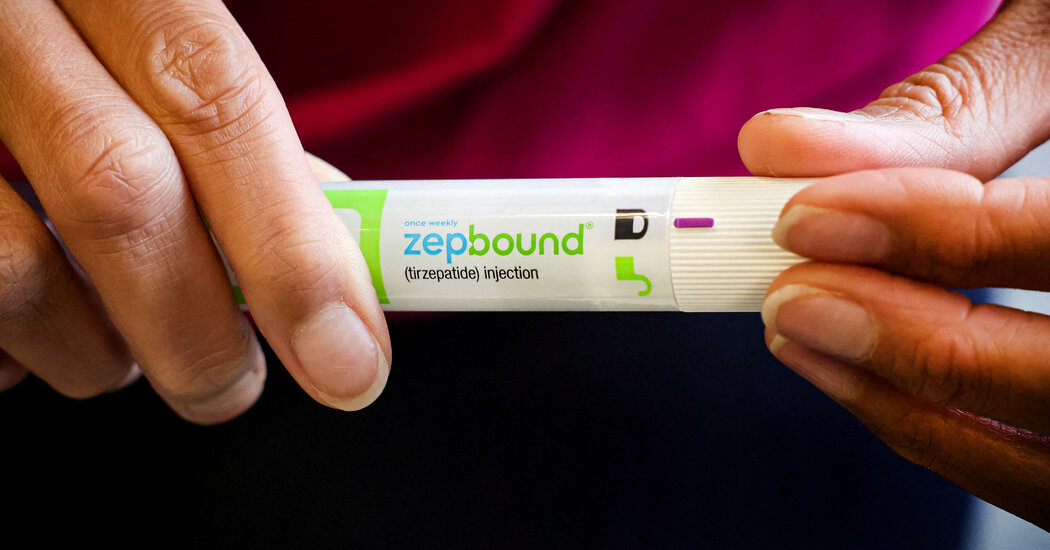The pharmaceutical manufacturer Eli Lilly announced on Wednesday that its obesity drug tirzepatide, or Zepbound, provided considerable relief to overweight or obese people who had obstructive sleep apnea, or episodes of stopped breathing during sleep.
The results, from a pair of yearlong clinical trials, could offer a new treatment option for some 20 million Americans who have been diagnosed with moderate to severe obstructive sleep apnea. Most people with the condition do not realize they have it, according to the drug manufacturer. People with sleep apnea struggle to get enough sleep, and they face an increased risk for high blood pressure, heart disease, diabetes, strokes and dementia.
The study’s findings have not been published in a peer-reviewed medical journal. Eli Lilly provided only a summary of its results — companies are required to announce such findings that can affect their stock price as soon as they get them. Dr. Daniel M. Skovronsky, Eli Lilly’s chief scientific officer, said the company was still analyzing the data and would provide detailed results at the American Diabetes Association’s 84th Scientific Sessions in June.
But experts not affiliated with Eli Lilly or involved in its studies were encouraged by the summary.
“That’s awesome,” said Dr. Henry Klar Yaggi, director of the Yale Centers for Sleep Medicine in New Haven, Conn.
He added that the most common treatment, a CPAP machine that forces air into the airway, keeping it open during sleep, is effective. About 60 percent of patients who use continuous positive airway pressure continue to use it, he said.
Dr. Eric Landsness, a sleep medicine researcher at Washington University in St. Louis, said the Lilly results were “phenomenal.”
They suggest, he said, that tirzepatide “is a great alternative for people who are obese and can’t use CPAP or are on CPAP and want to improve the effect.”
He added that unlike current treatments that address only the symptoms of sleep apnea, cessation of breathing, tirzepatide goes after the underlying cause, the blockages in the airway that makes a person stop breathing.
Tirzepatide, sold under the brand name Zepbound, was approved by the Food and Drug Administration for weight loss in November. The agency previously approved the drug for diabetes under the name Mounjaro. Tirzepatide is part of the class of GLP-1 drugs that includes Ozempic and Wegovy, which are sold by Novo Nordisk.
Patients who participated in these Eli Lilly trials were overweight or obese and had moderate to severe obstructive sleep apnea, with moderate defined as stopped breathing at least 15 times an hour during sleep. The trials did not involve those with central sleep apnea, a type that occurs because the brain stops signaling the muscles that control breathing.
One of the Lilly studies involved about 200 people with obesity who could not or were unwilling to use a CPAP machine. Half were randomly assigned to tirzepatide, a weekly injection. The others got a placebo.
Those who got tirzepatide had an average of 27.4 fewer apnea events per hour compared with an average reduction of 4.8 events per hour for placebo.
The other Lilly trial involved about 200 people with obesity who used a CPAP machine and were encouraged to continue using it except for the assessments of their apnea episodes. Those who took tirzepatide had an average of 30.4 fewer events per hour after a year of the drug, compared with an average reduction of six events per hour for participants who got a placebo.
In both studies, participants who took tirzepatide lost about 20 percent of their weight. Dr. Skovronsky of Eli Lilly attributed the results to the loss of fat deposits in the tongue and airway.
Many people with obesity, Dr. Landsness explained, have fat deposits in the tongue and in the back of the throat. The neck gets larger with fat that narrows the airway, and the tongue gets larger in all directions, “like blowing up a balloon,” he said. During sleep, the tongue obstructs the flow of oxygen, repeatedly waking the person repeatedly.
Researchers assumed that losing weight would reduce obstructive sleep apnea episodes. But before the new drugs like tirzepatide, significant and permanent weight loss was all but impossible for most people with obesity unless they had bariatric surgery.
Marishka Brown, director of the federally-funded National Center on Sleep Disorders Research, said it had been difficult to know how much of an effect weight loss would have on people with sleep apnea.
“Sometimes the sleep apnea goes away, but not always,” Dr. Brown said.
For that reason, she added, when asked if weight loss is an effective treatment, “the research community has been a bit cautious about saying yes or no.”
Now, with the new results, that tentativeness may change, researchers said.
Of course, everyone in the study was eligible for tirzepatide anyway — it is approved for people with obesity, meaning those with a body mass index of at least 30, or for those with a body mass index of at least 27 and with obesity-related medical conditions.
But insurance companies do not always pay for tirzepatide for weight loss. The drug’s list price is about $1,000 a month, but insurers pay much less. Eli Lilly sells the drug to people without insurance for $550 a month.
Dr. Skovronsky said that Eli Lilly planned to submit an application to the F.D.A. and to drug regulatory agencies around the world requesting that tirzepatide be approved for the reduction of sleep apnea in people with obesity or who are overweight.
“The goal is for insurance to cover it,” Dr. Skovronsky said.







